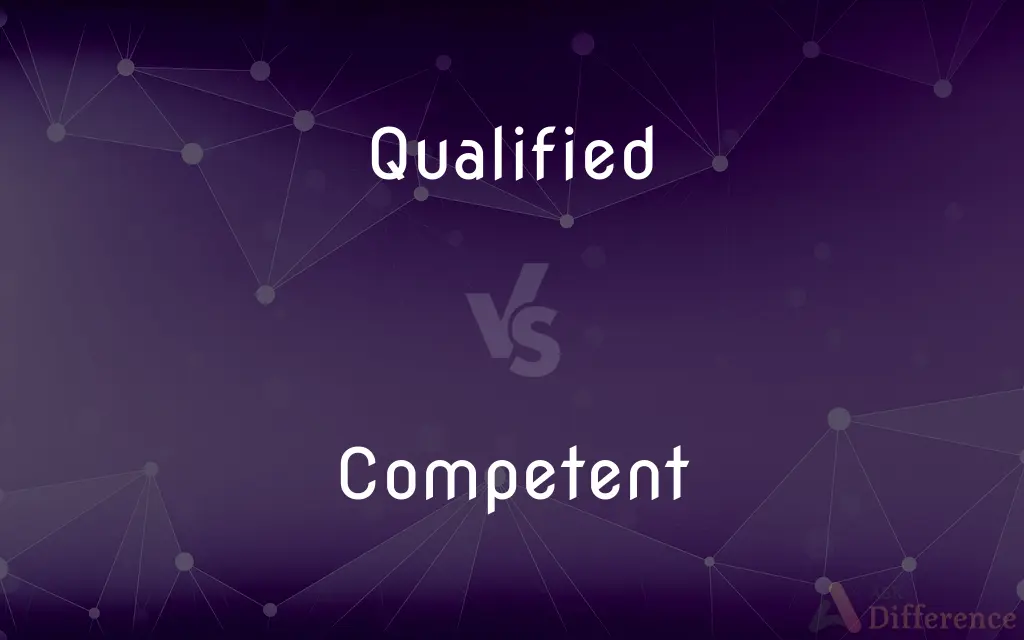Qualified vs. Competent — What's the Difference?
Edited by Tayyaba Rehman — By Urooj Arif — Updated on April 8, 2024
A qualified person holds the necessary certifications or degrees, while a competent person possesses the skills and ability to perform a task effectively.

Difference Between Qualified and Competent
Table of Contents
ADVERTISEMENT
Key Differences
Qualified individuals have met formal criteria, such as education, certifications, or professional licensing, which authenticate their ability to undertake specific roles or tasks. In contrast, competent individuals demonstrate the practical skills and knowledge required for effective performance, regardless of formal qualifications.
Qualification often involves passing exams, completing training programs, or receiving degrees from educational institutions, serving as a formal recognition of one’s ability. Competence, on the other hand, is assessed through the demonstration of ability and performance in real-world situations, highlighting practical experience and proficiency.
Being qualified implies that a person has been officially recognized by an educational or professional body, providing a standardized measure of their knowledge or skills. Competence, however, is more subjective and can vary according to different tasks, roles, or industries, focusing on the actual ability to perform effectively.
While qualifications can sometimes be a prerequisite for certain positions, demonstrating competence is crucial for success and efficiency in any role. Competence encompasses a broader range of skills, including problem-solving, adaptability, and practical knowledge, which are not always reflected in formal qualifications.
In many industries, a combination of both qualifications and competence is sought after, as qualifications can provide a foundation of knowledge, while competence ensures the practical application of this knowledge in real-life scenarios. Employers often look for individuals who are not only qualified on paper but also competent in their ability to apply their knowledge effectively.
ADVERTISEMENT
Comparison Chart
Basis
Formal education, certifications, licensing.
Skills, experience, and ability to perform tasks effectively.
Assessment
Through exams, degrees, and official recognition.
Evaluated based on performance and practical application.
Focus
Meeting set criteria or standards for education or professional roles.
Actual ability and proficiency in performing tasks.
Recognition
By educational or professional bodies.
Subjective, varies by industry, role, or task.
Importance
Often a prerequisite for entry into professional fields.
Crucial for efficiency and success in any role.
Compare with Definitions
Qualified
May not reflect current competence or practical ability.
Despite being highly qualified, he struggled with practical tasks.
Competent
Can apply to a wide range of tasks and industries.
Competence in digital marketing requires both creativity and analytical skills.
Qualified
Having met the formal criteria, such as certifications or degrees, for a particular role.
She is qualified to practice law in three states.
Competent
Based on practical application and results.
His competence was evident through his successful project management.
Qualified
Shows that a person has been recognized by a reputable body.
Her certificate qualified her as a financial advisor.
Competent
Gained through experience, practice, and continuous learning.
She developed her competence in surgery over many years of practice.
Qualified
Involves formal education and passing standardized tests.
After years of study, he became a qualified engineer.
Competent
Crucial for advancement and recognition.
His competence led to a promotion within just a year.
Qualified
Often a minimum requirement for job applications.
The job listing stated that only qualified candidates should apply.
Competent
Possessing the necessary skills and knowledge to perform a task effectively.
Her competence in programming made her an asset to the team.
Qualified
Officially recognized as being trained to perform a particular job; certified
Newly qualified nurses
Competent
Properly or sufficiently qualified; capable
A competent typist.
Qualified
Not complete or absolute; limited
I could only judge this CD a qualified success
Competent
Adequate for the purpose
A competent performance.
Qualified
Having the appropriate qualifications for an office, position, or task.
Competent
(Law) Legally qualified or fit to perform an act.
Qualified
Limited, restricted, or modified
A qualified plan for expansion.
Competent
Having sufficient skill, knowledge, ability, or qualifications.
He is a competent skier and an expert snowboarder.
Qualified
Meeting the standards, requirements, and training for a position.
Competent
(legal) Having jurisdiction or authority over a particular issue or question.
For any disagreements arising from this contract, the competent court shall be the Springfield Circuit Court.
Judicial authority having competent jurisdiction
Qualified
Restricted or limited by conditions.
Assuming that I have all the information, my qualified opinion is that your plan will work.
Competent
Adequate for the purpose
Qualified
Simple past tense and past participle of qualify
Competent
Permeable to foreign DNA.
Qualified
Fitted by accomplishments or endowments.
Competent
(geology) Resistant to deformation or flow.
Qualified
Modified; limited; as, a qualified statement.
Competent
Answering to all requirements; adequate; sufficient; suitable; capable; legally qualified; fit.
Qualified
Meeting the proper standards and requirements and training for an office or position or task;
Many qualified applicants for the job
Competent
Rightfully or properly belonging; incident; - followed by to.
That is the privilege of the infinite Author of things, . . . but is not competent to any finite being.
Qualified
Limited or restricted; not absolute;
Gave only qualified approval
Competent
Properly or sufficiently qualified or capable or efficient;
A competent typist
Qualified
Holding appropriate documentation and officially on record as qualified to perform a specified function or practice a specified skill;
A registered pharmacist
A registered hospital
Competent
Adequate for the purpose;
A competent performance
Qualified
Restricted in meaning; (as e.g. `man' in `a tall man')
Qualified
Having elements or qualities mixed in proper or suitable proportions; especially made less severe;
Justice moderated with mercy
Qualified
Contingent on something else
Qualified
Legally qualified;
A competent witness
Common Curiosities
How can competence be improved?
Through practical experience, ongoing learning, and adapting to new challenges.
Is it better to be qualified or competent?
Ideally, individuals should strive to be both; however, competence is often more crucial for practical success.
How is competence determined?
Through the demonstration of ability and effectiveness in performing tasks.
How do qualifications affect career opportunities?
They can open doors to entry-level positions and meet job market standards.
Are there ways to formally assess competence?
Yes, through practical assessments, peer reviews, and performance-based evaluations.
Do employers prefer qualifications or competence?
Employers typically seek a combination of both, but competence in performing job-specific tasks is essential for long-term success.
Can a competent person perform tasks outside their qualification?
Yes, a competent individual may be able to effectively perform tasks for which they are not formally qualified, depending on the skills required.
How do industries assess competence?
Through performance reviews, practical tests, and evaluating outcomes of assigned tasks.
What is the role of qualifications in regulated professions?
In regulated professions, qualifications are often legally required as a minimum standard for practice.
What makes someone qualified?
Achieving formal education, certifications, or licenses in a specific field.
Can a person be qualified but not competent?
Yes, someone can have the formal qualifications without the practical skills or current ability to perform effectively.
Can competence be formally recognized?
Yes, through awards, performance evaluations, and professional recognition, although it's less standardized than qualifications.
What impact does competence have on job performance?
Direct impact on efficiency, innovation, and the ability to meet or exceed job expectations.
What is the significance of qualifications in academia?
They are crucial for credibility, teaching permissions, and research opportunities.
How do continuing education and professional development relate to competence?
They are key for maintaining and expanding competence in a changing job market and industry standards.
Share Your Discovery

Previous Comparison
Issuance vs. Issue
Next Comparison
Hue vs. NuanceAuthor Spotlight
Written by
Urooj ArifUrooj is a skilled content writer at Ask Difference, known for her exceptional ability to simplify complex topics into engaging and informative content. With a passion for research and a flair for clear, concise writing, she consistently delivers articles that resonate with our diverse audience.
Edited by
Tayyaba RehmanTayyaba Rehman is a distinguished writer, currently serving as a primary contributor to askdifference.com. As a researcher in semantics and etymology, Tayyaba's passion for the complexity of languages and their distinctions has found a perfect home on the platform. Tayyaba delves into the intricacies of language, distinguishing between commonly confused words and phrases, thereby providing clarity for readers worldwide.
















































